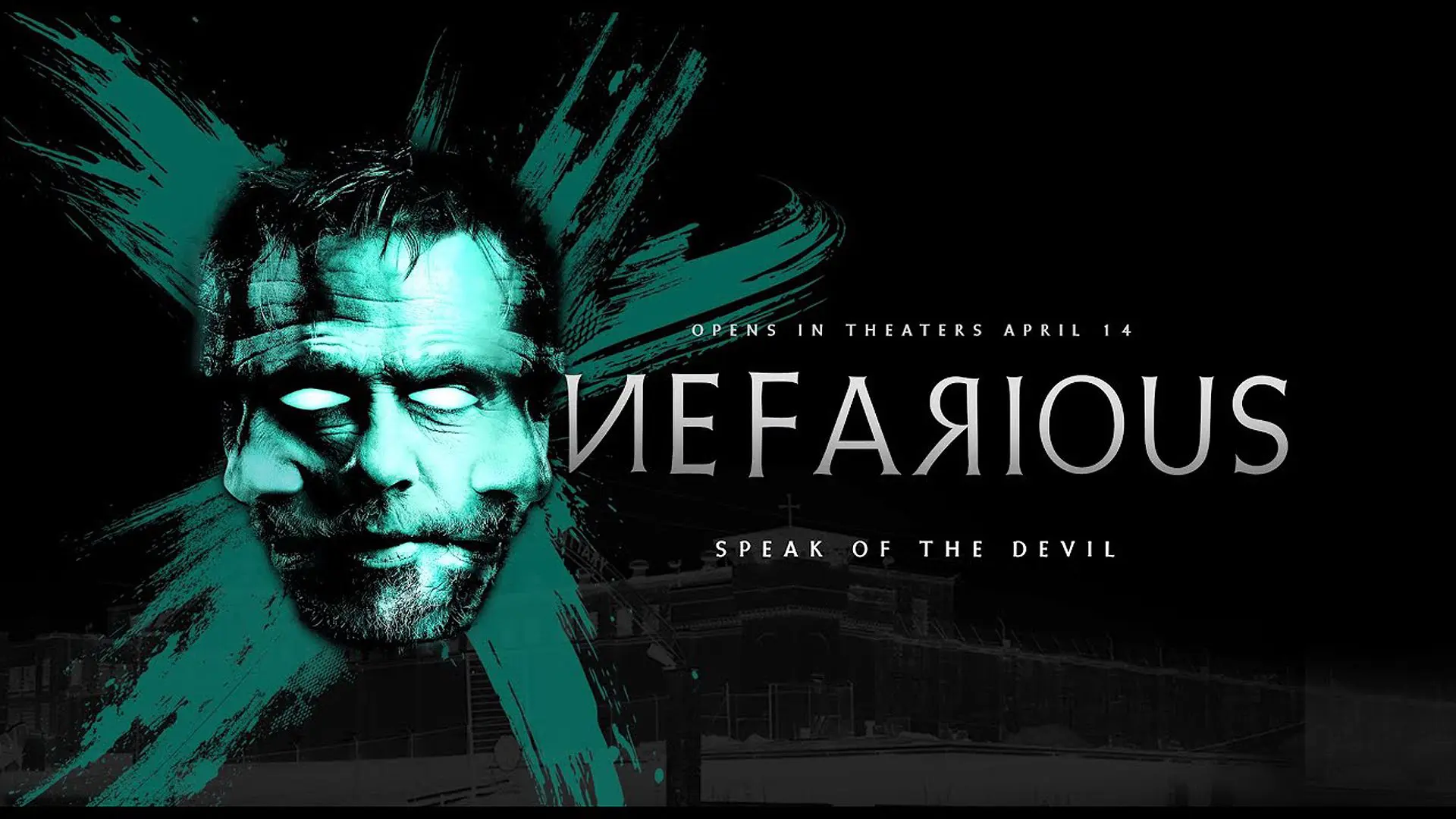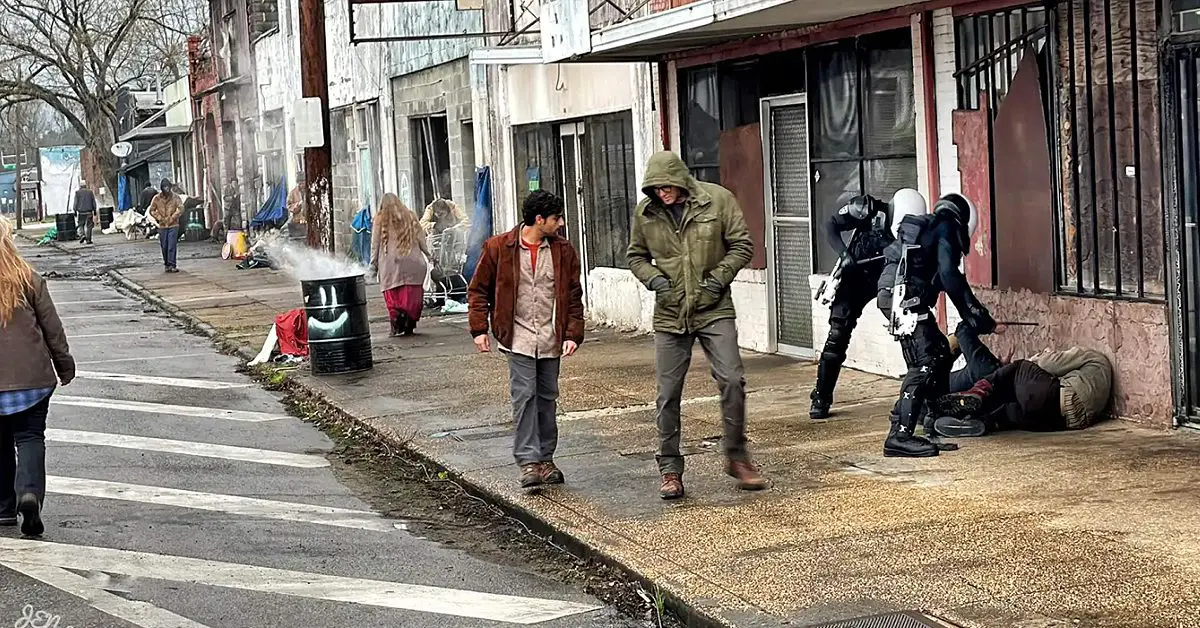OPINION –
When the preview for Nefarious was run last month before a Christian movie, I wondered why anyone would advertise a horror movie to an obviously religious crowd who would never pay to see such a thing. Inefficient marketing, I thought. The movie poster looks like the Frankenstein monster with two extra faces. I hate horror movies—ever since a blind date in college took me to a Stephen King movie and tried to take advantage of my palpitating heart.
Only the reputation of the Catholic filmmakers persuaded me to go, and even then, I was prepared to walk out if it was too much. Strangely, on the bottom of the ticket purchase page was a caveat I’ve never seen before: “□ By checking this box, you agree that all sales are final, and no refunds or ticket swaps will be made in an occasion where you miss the movie or decided to leave in the middle of the show.” The grammar of the statement makes me think it was created on the fly for this particular movie.
Nefarious is not a horror movie along the lines of Texas Chainsaw Massacre or Nightmare on Elm Street, which I plan to exit this life without ever having seen (see Carrie, above.) It didn’t have shower scenes, or someone presumed dead grabbing your ankle, or gore galore. It was basically a conversation between an unbeliever and a demon. And the demon had all the muscle.
On the day of his scheduled execution, a convicted serial killer must undergo a psychiatric evaluation to determine his sanity and competence to undergo execution. A confident young psychiatrist is sent in to render the diagnosis. The killer claims to be possessed by a demon, and he further claims that the doctor will commit three murders of his own before the day is out. The demon, Nefarious, does most of the talking in the interview, but the few glimpses of the wrecked human beneath are gut-wrenching. The demon is vastly intelligent, highly manipulative, crafty, and cruel.
The actor who plays this multi-faced character so dazzlingly is Sean Patrick Flanery. If awards meant anything anymore, I’d say he was a shoo-in. He’s been acting for a long time, with more than 50 films to his credit, but I’d never seen him before. My goodness, what a talent. The role could easily have been overplayed, making the demon into a caricature, but Flanery danced on a wire, flawlessly.
The young psychiatrist is played by Jordan Belfi, of Entourage and Grey’s Anatomy. His is a brilliant portrayal of breakdown, his glib unbelief shattering one splinter at a time under the sly onslaught of the demon.
The movie had tones of The Screwtape Letters (without the whimsy) as it drew the curtain back from the strategies and objectives of the dark angels. He tells us exactly how the demons win their game, and thus it becomes a warning for the audience. Like Screwtape, Nefarious plays the long game, waiting patiently as his subjects make tiny decisions wrong and, unexaminedly, go on to make bigger wrong decisions until the sins are so disastrous that the soul despairs and then belongs wholly to the demons.
Producers Chuck Konzelman and Cary Solomon were the locomotives behind the movie Unplanned, the Abby Johnson story of leaving Planned Parenthood and finding redemption. That movie had every chance of not happening, but it did. Konzelman and Solomon are lifelong friends, and each had an extended career in big-studio screenwriting before they decided to put their talents at the Lord’s service. They have been tempered in the forge.
As much as I admired Unplanned, the movie Nefarious goes far beyond it in originality, casting, and that quality of storytelling that grabs you from the beginning and shakes you mercilessly for two hours (99 minutes, to be exact) without respite; let’s call it relentless. As difficult as it was to watch in parts, I could not detach, couldn’t close my eyes or ears. It had me.
You can tell a great deal from the negative reviews it’s garnered. Roger Moore calls it a “Christo-fascist manifesto.” Christian Toto says the religious message spoils the fun. Mark Dujsik says the storytelling is sacrificed at the altar of messaging.
The thing is, I was never aware that it was a religious movie. The main character was a demon, yes, so by definition, it was spiritual. But it did not strike me as religious, the way God’s Not Dead did. There was theology, as the demon tells his story, and I went home and fact-checked it to my Bible, but it still struck me as reality not religion. As Frank Sheed said in Theology and Sanity, “To overlook God’s presence is not simply to be irreligious: it is a kind of insanity, like overlooking anything else that is actually there.” Or in other words, a movie that takes account of God and spirits is simply sane, not religious.
Nefarious did demon-strate how many of the things that we allow in this world are, in truth, tactics of the demons, like killing babies and the elderly as though we’re doing them a favor. The sort of priest who has lost his calling enters with an offer to accompany the condemned man, alarming the demon at first. But the demon exposes him as an accommodating, equivocating, rainbow-style mollusk of a man, and the priest scurries out like the Cowardly Lion.
Never once is the name of God or Jesus mentioned by the demon, who refers instead to The Enemy and The Carpenter. Demons do flee at the Holy Name, it seems. Nefarious acknowledges the power of names, calling the psychiatrist, whose name is, curiously, James Martin, “Jimmy” when he wants to get his goat.
Any more would give away the story, and I think this is a go-see for Christians, excepting perhaps the scrupulous. We all know that Satan is powerfully at work in our evil-is-good world, and we have even started calling things “demonic” and “Satanic,” deservedly. But seeing the pure malevolence of a demon, even on film, is a Come to Jesus moment. Sin has rarely seemed so loathsome to me, as I watched Nefarious have his way with an uncareful subject. Divine Mercy has rarely seemed so lovely.
Nefarious opened across the country on April 14 and performed nicely at the box office, ranking tenth over the opening weekend. It is rated “R” for an unbloody scene in which the demon maims himself. It is the first release of Soli Deo Gloria of Texas.

Sheryl Collmer is an independent consultant for several non-profit organizations. She holds a Masters in Theological Studies from the University of Dallas, as well as an MBA. She lives in the diocese of Tyler, Texas and also serves as CFO, co-coordinator of Region 8, and national news editor for CORAC.

















































I really didn’t want to see the movie, but people I respect said to go see it. Sheryl’s review is right on.
My HUGE takeaway was rethinking the death penalty. My goodness, I never thought that someone could actually be possessed. LOL. This character needed an Exorcism not the Electric Chair.
Then I began thinking about all the evil around us, wondering how many souls were possessed in one way or another.
Then I began thinking of all the people in the streets, hooked on drugs. Possibly former innocents who had been trafficked and abused. I do know that many of the angry women out in the streets with “pink” hats are soul injured by abortion. I met many during my post abortion ministry healing.
Most who commit deadly crimes, have themselves been abused. But if they do the crime, they must do the time–no early parole’s, etc.
I have someone that I send quarterly packages to. He is in for double homicide. He got life without parole. He’s 76yrs old now, converted, and believes he will be let out soon. I don’t think he should be let out. The 2 people he killed, and their families will never be let out of their nightmare.
Thanks for posting Sheryl. I hope everyone sees this movie. Sansan